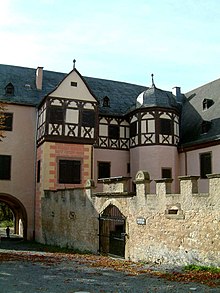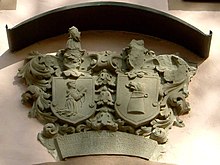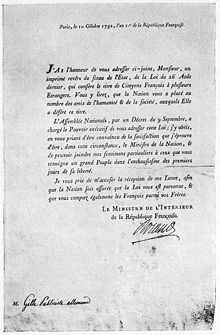Alexander von Gleichen-Sootworm
Alexander von Gleichen-Rußwurm (born November 6, 1865 at Greifenstein Castle in Bonnland , Lower Franconia ; † October 25, 1947 in Baden-Baden ), complete Heinrich Adalbert Carl Alexander Konrad Schiller, Baron von Gleichen, called von Rußwurm, was a German writer , Editor, translator and cultural philosopher. Also known as the "mouse baron", as an honorary great-grandson of Friedrich von Schiller , he was allowed to bear the family name Schiller in the female line of descendants.
Life

youth
Alexander von Gleichen-Rußwurm was born on November 6th, 1865 at Greifenstein Castle in Bonnland in Lower Franconia (today the Bad Kissingen district ). His father Ludwig von Gleichen-Rußwurm was a grandson of Friedrich Schiller and became known as a painter of Impressionist paintings. His mother Elisabeth, born Baroness von Thienen-Adlerflycht , died a few weeks after his birth, so that he was raised and significantly influenced by his grandmother Emilie , Friedrich Schiller's youngest daughter. In 1828 she married the future Bavarian chamberlain, Adalbert von Gleichen-Rußwurm, who was born at Greifenstein Castle. This castle was a former women's monastery, which was destroyed by Philip III in the Peasants' War in 1525 . von Thüngen was rebuilt as a Renaissance castle in 1568 and in the same century passed into the possession of the Saxe-Gotha-Hohenloh line of the Counts of Gleichen, who made it their ancestral seat alongside Rudolstadt. Emilie von Gleichen-Rußwurm had set up a museum in Greifenstein Castle in memory of her famous father and published his correspondence. Alexander von Gleichen-Rußwurm grew up in an environment that was shaped by the constant memory of his great-grandfather. A writing career was thus predetermined.
Military service and marriage
He attended the Casseler Institute and graduated from the war school in Metz . From 1883 to 1895 Alexander von Gleichen-Rußwurm served as an adjutant in the rank of lieutenant for the Grand Duke of Hesse-Darmstadt . After twelve years in the military, he married Baroness Sophie von Thienen-Adlerflycht , a niece of his mother's , in 1895 . He lived with her mainly at Greifenstein Castle and only in Munich during the winter months . During this time he made the acquaintance of great writers such as Heinrich Mann , Friedrich Lienhard and others in various literary salons in the city . a. Numerous trips took the couple across Europe. The guest book of Schloss Greifenstein, which was kept from 1891, shows a lively traffic of noble guests and writers like Johannes Fastenrath , Julius Maria Becker and others. a.
Businessman and mouse affair
Shortly after the First World War , he acquired the Hotel Krone in Wasserburg on Lake Constance and entered the flourishing tourism business. Apparently, however, he did not succeed in making decisive profits. At least he couldn't solve his financial problems. Mentally unstable, his efforts to emulate his great-grandfather Friedrich Schiller in literary terms must have weighed heavily on him. In October 1925 there was a spectacular incident that made Alexander von Gleichen-Rußwurm known outside of literary circles as the so-called “mouse baron”.
He had announced to a Munich jeweler a two-meter-long chain made of 234 cultured pearls that the latter should rework. The mail had been insured for 1,300 RM according to its value of 65,000 Reichsmarks. The jeweler did not find a chain in the intact insured letter, but only a dead mouse. Baron von Gleichen-Rußwurm reported the incident himself.
The extensive investigations dragged on for almost four years until, in May 1929, charges were brought against von Gleichen-Rußwurm before the Würzburg lay judges' court (2 judges, 2 lay judges, public prosecutor, 18 witnesses, 4 experts). He was accused of deliberately packing a live mouse instead of the chain, which was supposed to gnaw its way through the packaging during transport and thus simulate a damaged shipment. Since he was living in difficult financial circumstances at this time, he wanted - as the prosecution suspected - to obtain the insurance sum of 65,000 RM through this fraud.
Von Gleichen-Rußwurm indignantly rejected the allegations, but repeatedly referred to his attacked state of mind (splitting consciousness, hallucinations) in his defense. Finally, he admitted that it could be that he had mistakenly packed a dead mouse to be disposed of in an identical cigarette box in the insured letter and threw the chain into the stream. Friends tried to support him, but also mentioned that he had often expressed suicidal thoughts because of financial problems. The psychological reports of the experts (three of them had since died) contradicted each other. Some attested a disturbed state of mind and thus an unintentional wrongdoing. Others saw an abnormal twilight state and an "escape into illness after the crime". The court followed the prosecution's request, found the accused guilty and sentenced him to a fine of RM 10,000 in view of his pathological personality, his advanced age and a hitherto innocuous lifestyle.
After the verdict, Baron von Gleichen-Rußwurm continued his literary activity undiminished.
The time in Baden-Baden
After the reintroduction of compulsory military service in 1935 and the beginning of rearmament, the new rulers decided in 1936 to enlarge the Hammelburg military training area and relocate the two neighboring villages of Hundsfeld and Bonnland to the south. The residents were compensated for the loss of their land. The von Gleichen-Rußwurm family also had to leave their headquarters in Greifenstein Castle with all their properties in 1938.
As early as 1880, Alexander, together with his father Ludwig Heinrich, donated extensive legacies from his great-grandfather to the Goethe Archive in Weimar from the collection of the Schiller Museum at Greifenstein Castle, which was set up by his grandmother. Archive ”received. In 1938, when the Greifenstein Castle was closed, von Gleichen-Rußwurm gave all the memorabilia of Friedrich Schiller that remained there to the Schiller National Museum in Marbach am Neckar and the Mainfränkisches Museum in Würzburg .
The childless couple moved to Baden-Baden and lived in the Villa Menschikow above Lichtentaler Allee . The guest book again lists prominent writers such as Gerhart Hauptmann , Otto Flake and Börries Freiherr von Münchhausen .
When, after the end of the Second World War, the French army requisitioned buildings for their purposes in 1945, von Gleichen-Rußwurm received an "inheritance benefit" by presenting his great-grandfather's certificate of honorary citizenship from the French Republic. The honorary citizenship once granted to Friedrich Schiller and signed by Danton was automatically transferred to his descendants.
- “When the French army entered, Baron von Gleichen-Rußwurm was immediately placed under the protection of the occupying power. His residence at Lichtentaler Allee 12 was given the blue-white-red letter of protection to which all allied foreigners were entitled, which included all special rights. "
He spent another two years in Baden-Baden, where he finally died almost forgotten and impoverished on October 25, 1947. General Marie-Pierre Kœnig , the commander in chief of the French occupation forces in Germany, expressed his condolences to the widow in moving words.
With Alexander von Gleichen-Rußwurm, Friedrich Schiller's tribe died out. His wife Sophie died five years later in the fall of 1952.
personality
The high moral demands derived from the past, which Alexander von Gleichen-Rußwurm made of himself, and the knowledge of the mouse story make the writer's personality appear complex and contradictory. In any case, his aesthetic, aristocratic dandyism made him the subject of deliberate irony in literary circles. In this capacity, Gleichen-Rußwurm appears - named - in Thomas Mann's " Doktor Faustus " three times: first as a baron who wrote books on cultural history ; the second time as the author of the mouse story and a third time when he appeared in public for the first time after the affair at Adrian Leverkühn's invitation. At that time, man did not yet know the true background. Von Gleichen-Rußwurm served him in his novel as an example of the moral confusion of the time after the First World War.
Works
Having been familiar with the ideas and works of German classical music from an early age and significantly influenced by his grandmother, von Gleichen-Rußwurm endeavored to create his own works in the same spirit. He created an extensive oeuvre that was committed to the dissemination of classical and idealistic-humanitarian ideas. So he wrote alongside dramas
- Friendship A psychological research trip. Julius Hoffmann, Stuttgart 1912 (also published as leather special edition numbered)
- King man
Novellas and poetry also include comprehensive cultural-historical representations such as the six-volume
- History of European Sociability (1909 to 1921)
- from “the noble world in classical antiquity” to the “manners and customs of the European world 1789–1900” - as well as with Leo Schidrowitz one of 24 volumes
-
Cultural and moral history of all times and peoples (1929 to 1931).
- as an author in it, for example: the moral history of the bathroom. In: Leo Schidrowitz (Hrsg.): Moral history of the intimate: bed - corset - shirt - pants - bathroom - toilet. The history and development of intimate everyday objects. Vienna and Leipzig undated (series title: Sittengeschichte der Kulturwelt und their development in individual representations ), pp. 219–268.
There is also an extensive series of individual representations, such as B. the
- Aesthetics of the Tie (1936)
or
- The Longing for Salvation of the Centuries (1937).
He translated many works from French and Greek. Of course, he felt called above all to be the biographer and interpreter of his great-grandfather. In 1914 he published
- Schiller - The story of his life
and not as a product of knowledge acquired through study, but from family tradition and the stories of the grandmother.
He also wrote the first comprehensive biography of the
- Wilhelmine of Bayreuth .
His writings saw numerous editions in the first three decades of the last century. Initially with a focus on the criticism of political and social developments in the period between the Empire and the Weimar Republic, his work was increasingly determined by miraculous and emphatically emotional moments and content.
literature
- Leonhard Lenk: Same named by Rußwurm, Heinrich Adelbert Konrad Carl Alexander Schiller Freiherr von. In: New German Biography (NDB). Volume 6, Duncker & Humblot, Berlin 1964, ISBN 3-428-00187-7 , p. 445 f. ( Digitized version ).
- Christian Fuchs: Schiller's great-grandson. A Frankish essayist: Alexander von Gleichen-Rußwurm . Manuscript for the special broadcast of Bayerischer Rundfunk, Studio Nürnberg, from May 31, 1984. Bayerischer Rundfunk, Nürnberg 1984.
- Karin Rother: Alexander von Gleichen-Rußwurm . Entry in Walther Killy (Ed.): Literaturlexikon. Authors and works in German . (Digital Library 9): CD-ROM / DVD-ROM, Directmedia Publishing, Berlin 1998, ISBN 3-932544-13-7 .
- Fridolin Altweck: Carl Alexander von Gleichen-Rußwurm, successful author - model aristocrat - mouse baron . Biography in the yearbook of the Lindau district 2006. Eppe publishing house, Aulendorf / Bergatreute 2006, ISBN 3-89089-085-7 , pp. 116–129.
Web links
- Literature by and about Alexander von Gleichen-Rußwurm in the catalog of the German National Library
- Works by and about Alexander von Gleichen-Rußwurm in the German Digital Library
- Works by and about Alexander von Gleichen-Rußwurm at Open Library
- Short biography of Alexander von Gleichen-Rußwurm in the name of art
- Alexander von Gleichen-Rußwurm on the website of the city of Baden-Baden - With portrait
- Gleichen-Rußwurm on the website of the Ludwig-Feuerbach-Gesellschaft e. V. Nuremberg
Footnotes (notes, individual references)
- ↑ Alsace-Lorraine was part of the German Empire from 1871 to 1918
- ↑ a b from: Altweck, Fridolin: "Carl Alexander von Gleichen-Rußwurm".
- ^ From a newspaper report about 1945 in Baden-Baden
- ↑ LE GENERAL KOENIG Baden-Baden, November 7th, 1947 BARONNE von GLEICHEN-RUSSWURMLichtentaler Allee 12, Baden-Baden Madame, I was saddened to learn of the death of Baron von Gleichen, which must have occurred very suddenly, as you said in your last letter , which I received recently, did not mention anything about being sick. It is very important to me to express my heartfelt condolences to this loss which will make you alone in the future and which robs France of a sincere and loyal friend. In memory of him and out of gratitude for his loyalty to my country, which he loved very much, I ask you to allow me to see to it that you lack nothing. Of course, I will continue to look after you, as I have done in the past, and I ask you to contact me without hesitation. King
| personal data | |
|---|---|
| SURNAME | Same-sootworm, Alexander von |
| BRIEF DESCRIPTION | German writer |
| DATE OF BIRTH | November 6, 1865 |
| PLACE OF BIRTH | Greifenstein Castle |
| DATE OF DEATH | October 25, 1947 |
| Place of death | Baden-Baden |

